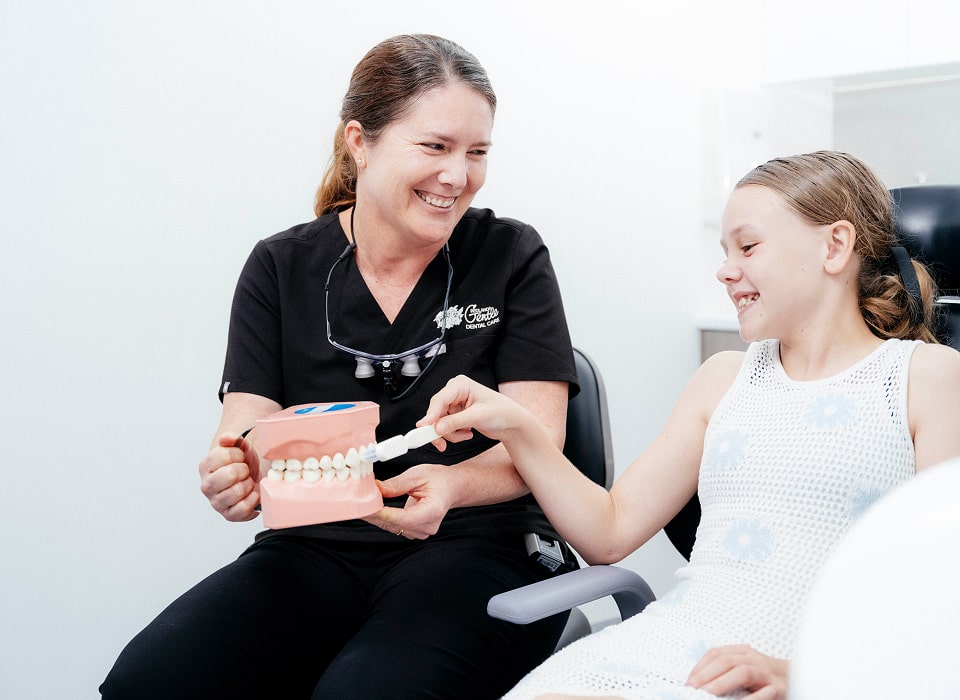Experience High-Quality Dental Implants in Brisbane for a Confident, Radiant Smile
Why Choose Us
Why Choose Redlands Gentle Dental Care for Dental Implants in Brisbane

Experienced and Highly Qualified Dentists

Advanced and Trusted
Dental Implants System

Flexible Payment Options
Tailored to Your Needs

Patient-Centered Care
The Dentists
Meet Your Dental Implant Dentists at Redlands Gentle Dental Care

BDSc. (Hons) (QLD) MClin Dent (Implant Dentistry) | Capalaba
Dr. Chris Waters
- Dr. Chris Waters is a skilled dental professional with over 16 years of experience in implant procedures and patient care.
- He completed a Master of Clinical Dentistry in Dental Implants, focusing on advanced techniques and treatment planning.
- Dr. Waters holds a Bachelor of Dental Science Honours from the University of Queensland (2002) and an MClinDent from Griffith University (2013).

B.Dent. Hons (Syd) | Victoria Point
Dr. Colin Phan
- Dr. Colin Phan is a skilled dentist with significant experience in providing dental implant treatments for patients.
- He has completed extensive training in dental implants, focusing on restoring teeth with reliable and durable results.
- Dr. Phan graduated with a Bachelor of Dentistry from the University of Sydney in 2014, laying a solid foundation in dentistry.
Two Convenient Locations
Quality Dental Services Made Accessible for Families in the Victoria Point and Capalaba Areas
Capalaba Dental Clinic
- (07) 3245 5511
- 149 Old Cleveland Rd Capalaba, QLD, 4157
- Free Parking Available
Victoria Point Dental Clinic
- (07) 3820 7777
- 2/1 Bunker Road, Victoria Point, QLD, 4165
- Free Parking Available

Explore All About Dental Implants for Lasting Oral Health
Tooth loss and damaged teeth are common concerns among Brisbane residents. Around 1 in 3 adults experience tooth loss, often due to injury, decay, or other health challenges. These patients may need dental implants for proper tooth restoration.
Missing teeth can affect confidence and quality of life. In addition to cosmetic concerns, it can cause oral health risks such as jaw bone deterioration. Gaps from missing teeth can also lead to neighbouring teeth shifting, which complicates dental health.
At Redlands Gentle Dental Care in Brisbane, dental implants provide a reliable method for replacing missing or damaged teeth. The process involves placing a titanium post into the jawbone and attaching an artificial tooth. In case of insufficient bone density, bone grafting may be required to support implant placement and promote implant stability.
Experience The Benefits of Improved Functionality with Dental Implants
Dental implants are an effective option to replace missing or damaged teeth. They help restore your ability to chew, speak, and smile confidently. Below are some of the key benefits dental implants can offer:
- Dental implants prevent jaw bone deterioration by stimulating the bone, which helps preserve its natural structure and prevent further bone loss.
- They offer a strong foundation for artificial teeth, allowing for better chewing and comfort than dentures, making it easier to eat.
- Implants improve speech by replacing missing teeth, reducing the risk of lisping and allowing for clearer communication.
- Dental implant surgery enables the precise placement of implant posts, resulting in a stable, natural-looking tooth replacement that mimics the appearance and function of real teeth.

Patient Reviews
Read Patient Testimonials About Their Experience with Our Gentle Dental Care
Megan M
Courtney
Megan Dickie
Sam Arthy
Janette P
Megan M
Courtney
Megan Dickie
Sam Arthy
Janette P
Stephen Travers
Jan Zielinski
Tom McEwan
Sonja Stevens
Moea Barber
Stephen Travers
Jan Zielinski
Tom McEwan
Sonja Stevens
Moea Barber
Before and After Gallery
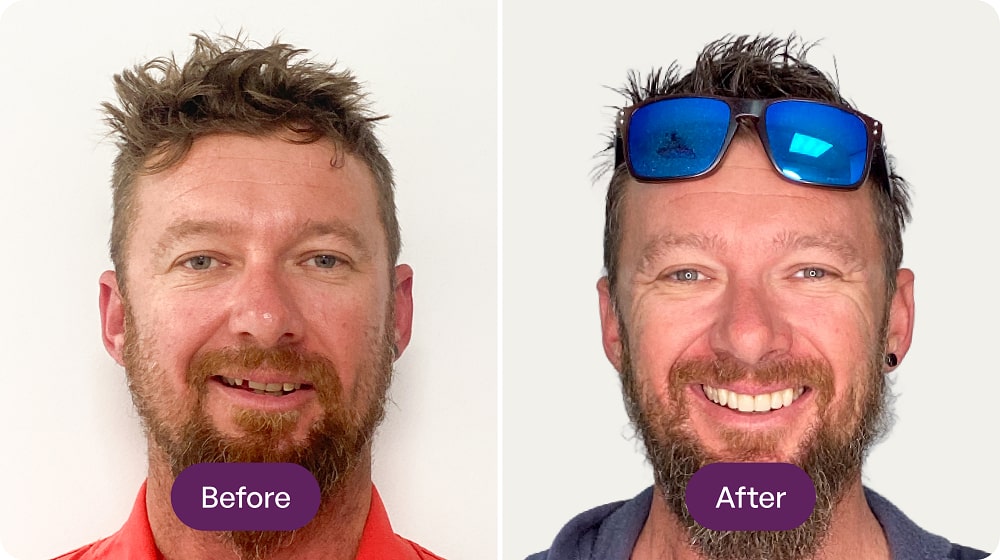
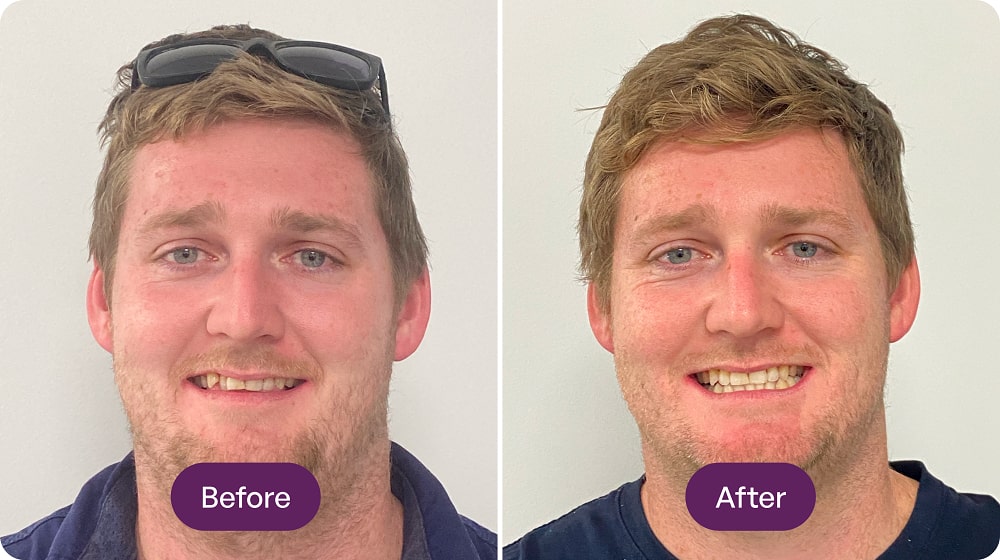
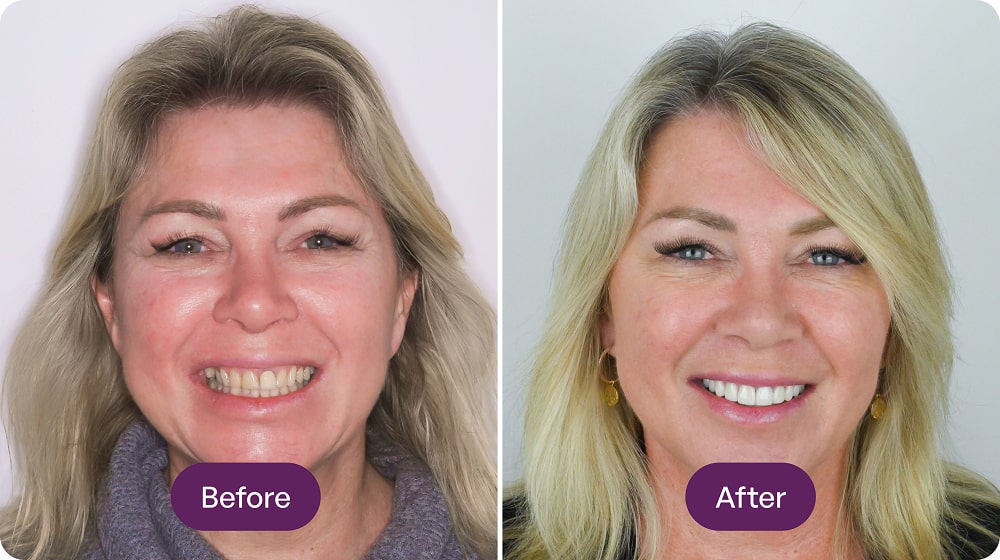
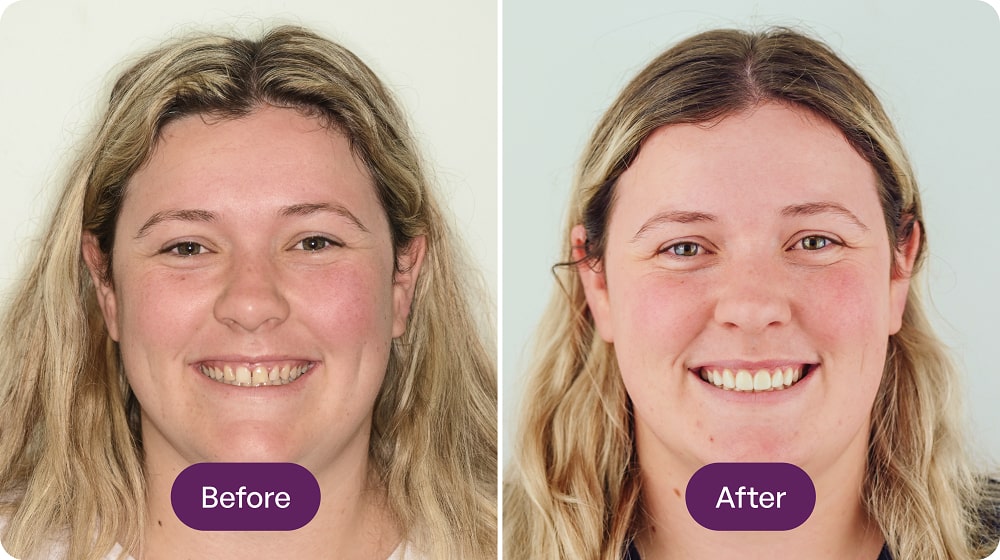
*These images display actual patients of our clinic. Every case is different, and treatment outcomes can vary according to individual conditions and needs.

Take the First Step Toward a Confident Smile Today with Dental Implants
Comprehensive Comparison of Dental Implants and Alternative Treatments
| Feature | Dental Implants | Dental Bridges | Traditional Dentures |
|---|---|---|---|
| Longevity | 5-15 years with proper care | Over 10 years, may require replacement over time | 5-8 years, may need adjustments or replacement |
| Jawbone Preservation | Stimulates and preserves jawbone | Does not stimulate jawbone, may lead to bone loss | Does not stimulate jawbone, can cause bone loss |
| Comfort | Comfortable, feels like natural teeth | Comfortable, but can cause irritation or sensitivity | May cause discomfort and require adhesives |
| Cost | Higher initial cost | Lower cost than implants but can add up over time | Most affordable option initially, but requires upkeep or replacement later on |
| Maintenance Requirements | Low maintenance, requires regular brushing and check-ups | Requires cleaning and may need replacement | Regular cleaning, relining, and adjustments needed |
| Aesthetic Result | Natural-looking and blends well with surrounding teeth | Can look natural, but may not blend as seamlessly | Can look natural, but may appear bulky or artificial |
Dental Implant Consultation
Discover a Personalised Treatment Plan for Dental Implants During Consultation with Us





Initial Consultation and Discussion

Comprehensive Oral Examination

Diagnostic Imaging

Treatment Planning

Consultation Review

Dental Implant Steps
Understand the Steps of the Dental Implant Procedure in Detail
With over 30 years of experience in providing dental implants to the Brisbane community and surrounding areas, our team follows a precise, detailed process. Please note that procedure details may vary depending on your individual needs.







Initial Consultation and Assessment

Treatment Planning

Implant Placement

Healing and Osseointegration

Abutment Placement

Final Restoration Placement

Post-Procedure Care

Dental Implant Cost
Explore Our Transparent Pricing of Dental Implants to Guide Your Treatment Decisions
Single Tooth Implants
A missing tooth can affect your appearance, bite, and speech. A single-tooth dental implant replaces it, preventing bone loss and restoring function.
- The cost covers the surgical placement of the implant, including the titanium post and the fee for the dental professional who will perform the procedure.
- It includes the abutment and custom-made crown designed to restore the tooth's function and appearance.
- Pre-treatment evaluations, such as consultations and imaging, are also included for accurate planning and assessment.
Multiple Implants
Replacing multiple missing teeth with implants prevents oral health complications, including bone deterioration. This option eliminates the need for traditional bridges or partial dentures.
- The cost is determined based on the number of implants required and the case's complexity, as each treatment is unique.
- Costs typically include the implant components, such as the posts, abutments, custom-made crowns or bridges, and the surgical procedure.
- Additional costs may apply for bone grafting or sinus lift procedures, if required and follow-up visits.
Implant-Retained Dentures
For those missing most or all teeth, implant-retained dentures are a trusted choice. By anchoring the denture to implants, this offers long-term comfort and durability.
- The cost includes the placement of implants that will hold the dentures securely.
- It covers the attachment components, such as abutments, that connect the implants to the dentures to keep them in place during daily activities.
- Custom dentures are included to replace missing teeth and work specifically with the implant system for effective functionality.
Implant-Supported Dentures
Implant-supported dentures provide a durable and comfortable alternative to traditional dentures, offering enhanced stability and functionality. They eliminate the need for adhesives and reduce dietary restrictions.
- This treatment involves surgically placing dental implants into the jawbone and establishing a secure foundation for the dentures.
- It covers the creation of custom dentures designed to fit securely over the implants, improving comfort and functionality.
- The fee may not include preparatory procedures, such as bone grafting, which facilitate stable bone support in case of insufficient bone density.
Our Payment Plans
Find What Works for Your Financial Needs With Our Dental Payment Plans
Child Dental Benefits Schedule
Invest in your child's smile with the Child Dental Benefits Schedule (CDBS). This government program offers eligible families financial support for essential dental services, promoting good oral health habits from an early age.
The CDBS covers up to $1,095 over two years for basic dental care like check-ups, cleanings, and fillings for children aged zero to 17. Eligibility depends on Medicare status and specific government payments, making quality dental care more accessible to families.
Learn MoreDental Services for DVA Card Holders
Veterans deserve high-quality dental care, and the Department of Veterans' Affairs (DVA) program delivers just that. The program offers dental benefits that vary based on card type.
Gold Card holders receive comprehensive cover for clinically necessary treatments, from routine check-ups to advanced procedures. White Card holders are covered for dental care related to accepted service-related conditions or mental health needs. Our clinic proudly supports veterans by providing high-quality dental care to maintain their overall health.
Learn MoreHumm
Simplify your dental care payments with Humm, a flexible financing option that lets you smile now and pay later. This interest-free payment plan allows you to spread the cost of your dental treatments over time, making essential care more accessible.
Humm is available for various dental services, from routine check-ups to more complex procedures. With instant approval and the ability to manage your account online, Humm helps you prioritise your oral health without financial stress.
Learn MoreZip
We offer Zip to help patients manage treatment costs. With credit limits between $1,000 and $50,000, eligible patients can select flexible repayment terms from three to 60 months, making it easier to manage costs.
Zip is ideal for anyone needing dental care without upfront costs. The user-friendly app allows you to track payments easily, so you can stay on budget while prioritising your oral health.
Learn MoreSuperCare
With the help of SuperCare, eligible patients can release their superannuation funds early to access essential dental procedures. This option is suitable for families lacking sufficient health funds or available resources, covering services such as orthodontics, implants, and root canal therapies.
SuperCare's consultants guide you through the straightforward application process, simplifying what can often be complex. This service enables you to prioritise your family's oral health without the burden of upfront costs.
Learn MoreAfterPay
Experience the convenience of dental care with Afterpay, allowing you to receive treatments now and pay later in four easy instalments over six weeks. This payment option is available to anyone over 18, a practical choice for adults looking to enhance and maintain oral health.
With no interest charges when payments are made on time, Afterpay promotes responsible budgeting. Payments are automatically deducted from your linked debit or credit card for a smooth experience.
Learn MoreBupa Preferred Provider
Enjoy exclusive benefits and hassle-free claims when you choose our clinic, a Bupa Preferred Provider, for your dental health needs. Our patients can access a comprehensive range of services, including check-ups and major procedures, often at reduced out-of-pocket costs.
Members First Ultimate also offers 100% back on two dental check-ups and cleans every six months, making regular oral care more affordable. Our partnership with Bupa allows you to receive quality care while maximising your benefits.
Learn MoreHCF Preferred Provider
Experience affordable, high-quality dental care at Redlands Gentle Dental Care. As an HCF preferred provider, patients with eligible dental cover can access reduced out-of-pocket costs, no-gap services for selected treatments, and streamlined claims processing.
HCF members can take advantage of these benefits by choosing our clinic for their dental needs. Check your policy to understand covered treatments and annual limits, and let us help you achieve a healthier, brighter smile.
Learn Morenib Preferred Provider
Access professional dental care at our clinic, a trusted part of nib's First Choice network. As a nib Preferred Provider, we offer members the opportunity to receive quality dental care at agreed rates. This provides a transparent and straightforward experience for your dental needs.
Nib members benefit from reduced out-of-pocket costs and simplified claims processes at our clinic. To make the most of your cover, review your policy for applicable limits and service inclusions.
Learn MoreAnswers to Your Dental Implant Questions
Frequently Asked Questions
How common is tooth loss among Brisbane residents?
Tooth loss is a serious issue for adults in Australia, and it varies by age. The National Study of Adult Oral Health from 2017–18 found that 4% of adults aged 15 and older had lost all their natural teeth.
The chance of losing all teeth increases as people age. For instance, only 1.1% of adults aged 35–54 are edentulous, but this number rises to 20.5% for those aged 75 and older.
Though there isn’t much specific data for Brisbane, these national figures prove the need for good oral hygiene and regular dental visits to help prevent tooth loss.
What is the appropriate age for getting dental implants?
How do dental implants replace damaged or missing teeth?
Dental implants replace missing or damaged teeth by acting like natural tooth roots. The main concept relies on integrating a durable, biocompatible material with the jawbone, creating a stable foundation for supporting the tooth replacement option.
Dental implants have the following three key components:
- Dental implant fixture:
This titanium post is surgically placed into the jawbone. It fuses with the bone through a process called osseointegration, providing stability like a natural tooth root. - Abutment:
This small connector attaches to the implant fixture, serving as a link between the implant and the crown. - Crown:
The custom-made crown is the visible part of the implant. It resembles and functions similarly to a natural tooth, restoring appearance and chewing ability.
By working together, these components replicate the structure of a real tooth, effectively replacing them. This design not only restores function and appearance but also promotes long-term oral stability and health.
Are dental implants as good as natural teeth?
How many teeth can be replaced with dental implants?
What is the success rate of dental implants?
When properly cared for, dental implants have a 90%–95% success rate over ten years. Several factors can affect how well they last:
- Bone Strength
The strength of the bone where the implant is placed matters. Stronger bone helps the implant stay secure, while weaker bone increases the risk of failure. Studies show that weaker bone has a 3% failure rate. - Implant Size
Shorter implants over 11.5 mm long have a higher chance of failing than medium-sized ones between 10–11.5 mm. Narrow implants under 3.75 mm wide are also more likely to fail. - Implant Placement
Where the implant is placed in the mouth matters. Implants in the back lower jaw have the highest failure rate (3.3%), while implants in the front upper jaw fail less often (2.1%). - Daily Care and Dental Visits
Keeping the area clean prevents infection and gum issues that can lead to implant failure. Brushing, flossing, and seeing a dentist regularly help protect the implant. - Smoking and Health Conditions
Smoking doubles the risk of failure because it affects healing. Conditions like diabetes and bone disease can weaken the implant’s support, but proper management lowers risks. - Biting Pressure and Placement
If an implant is not placed properly or is under too much pressure, it may fail over time. A well-placed implant that matches the bite stays stronger for longer.
With good daily care, regular check-ups, and the proper placement, dental implants have a high success rate and can last many years.
What materials are commonly used for dental implants?
Dental implants are primarily made from two materials:
- Titanium:
This metal is widely used for dental implants due to its strength, weight, and ability to fuse well with bone. - Zirconia:
This ceramic material is chosen for its tooth-like colour and durability, offering an aesthetic alternative to metal implants.
Choosing between these materials depends on individual factors such as health considerations and aesthetic preferences. Discussing options with your dentist can help determine the most suitable material for your dental implant.
What happens if I don't have enough jawbone for an implant?
How soon after an extraction can I get a dental implant?
Are getting dental implants painful?
How long does a dental implant take from start to finish?
The dental implant process usually takes between three and six months, depending on the case and the healing time required. Several key phases make up the procedure, each contributing to the success and longevity of the implant:
- Initial consultation and planning (one to two hours):
During this phase, the dentist evaluates your oral health, performs scans, and discusses your personalised treatment plan. - Tooth extraction and site preparation (if required) (four to 12 weeks):
If a damaged tooth needs removal or bone grafting is required, healing must occur before placing the implant. - Implant placement (one to two hours):
The titanium implant is surgically inserted into the jawbone during a simple procedure with local anaesthesia. - Osseointegration and healing (three to six months):
The implant fuses with the jawbone during this phase, creating a stable foundation for the artificial tooth. - Abutment placement and gum healing (one hour):
The dentist connects the abutment to the implant and lets the surrounding gum tissue heal for two to three weeks. - Crown placement (one to two hours):
A custom-made crown is fitted and secured onto the implant abutment, completing the process and restoring the tooth’s function and appearance.
The duration of each phase depends on factors such as healing time and the complexity of the case. Following the dentist’s recommendations throughout the dental implant process promotes a smooth and successful treatment experience.
What is the recovery time after getting dental implants?
The recovery time after getting dental implants usually takes three to six months for full healing and integration. Here are the healing phases patients normally go through:
- Immediate post-surgery healing (one to two weeks):
After the dental implant procedure, the gum tissue begins to heal. Swelling, mild discomfort, and bruising usually subside during this time. - Initial bone healing (four to six weeks):
The jawbone starts fusing with the implant, but this phase marks the beginning of a longer osseointegration process. - Osseointegration (three to six months):
During this important stage, the implant fuses with the jawbone to form a strong base for the replacement tooth. - Abutment healing (two to three weeks):
Once the abutment is placed, the gum tissue heals around it, preparing for the attachment of the final crown.
The total recovery timeline depends on the implant patient’s healing rate, the complexity of the case, and the quality of aftercare. Following proper care instructions and attending regular check-ups are essential to experiencing a smooth recovery and successful implant integration.
Do dental implants become loose over time?
No, dental implants should not become loose over time if they are placed accurately and maintained with proper care. However, specific factors can cause loose teeth, and understanding these can help address potential issues. Here are the possible causes:
- Bone loss around the implant:
If the jawbone supporting the implant deteriorates, the implant may lose its stability and feel loose over time. - Peri-implantitis:
This is an infection of the gum and bone surrounding the implant, which can damage tissues and cause loosening if not addressed. - Overloading the implant:
Excessive force from grinding, clenching, or uneven biting pressure can stress the implant, leading to movement or loosening. - Improper placement:
If the implant is not positioned ideally, it may not integrate properly with the jawbone, causing instability over time. - Damaged or worn restoration:
The crown, bridge, or denture attached to the implant can wear out or loosen, creating the impression that the implant is loose.
While implants are designed to be durable and stable, addressing these factors early helps maintain their long-term success. Regular dental visits and good oral hygiene practices can prevent complications that could lead to implant loosening.
What aftercare is needed for dental implants?
Proper aftercare is vital for the healing and long-term success of dental implants. Follow these detailed steps to maximise the benefits of dental implants:
- Manage swelling and discomfort immediately after dental implant surgery:
Use an ice pack on your cheek near the implant site in 15-minute intervals to reduce swelling during the first 24 hours. Take any prescribed or over-the-counter pain relief medication as directed by your dentist to minimise discomfort. - Stick to a soft food diet for the initial healing period:
Eat soft foods such as yoghurt, mashed potatoes, soups, and smoothies for the first few days. Avoid hard, crunchy, or sticky foods, as these can irritate the surgical site or dislodge the implant. Gradually reintroduce solid foods based on your dentist’s advice. - Practise thorough oral hygiene daily:
Brush your teeth gently with a soft-bristled toothbrush and a non-abrasive toothpaste to clean the implant site without irritating the healing tissue. Avoid brushing directly over the surgical area until your dentist advises it is safe. Floss daily to keep the area around the implant clean. - Avoid smoking and alcohol:
Refrain from smoking entirely, as it can slow down the healing process and increase the risk of infection or implant failure. Avoid alcohol for at least the first week after the surgical procedure, as it interferes with your body’s healing process. - Attend regular dental check-ups:
Schedule follow-up visits as recommended by your dentist to monitor your healing progress and address any concerns. Your dentist may also clean the area professionally during these visits to prevent infection. - Use cleaning tools designed for dental implants:
Incorporate interdental brushes or water flossers into your daily routine to clean hard-to-reach areas around the implant, as advised by your dentist. These tools help maintain the cleanliness of the implant and prevent gum disease. - Protect the implant from excessive force:
Avoid clenching or grinding your teeth, as these bad habits can stress the implant. If you have teeth grinding issues, inform your dentist immediately. - Stay hydrated and eat a balanced diet:
Drinking plenty of water supports bone tissue healing and helps flush away bacteria. Eating a diet rich in vitamins and minerals, such as vitamin C and calcium, can promote bone and gum health.
Following these detailed steps helps your implant heal properly and remain functional for years to come. Consistent oral hygiene habits and regular dental visits help maintain the benefits of dental implants.
How often do I need to visit the dentist after getting implants?
What are the risks or complications of dental implants?
Dental implants are a long-term option for replacing missing teeth but carry some risks. The following complications can occur, along with ways to reduce them.
- Infection Around the Implant
Bacteria buildup can lead to peri-implantitis, causing gum inflammation and bone loss. Regular professional cleanings, daily brushing, and flossing can help prevent this. Water flossers with chlorhexidine may further reduce bacteria and inflammation. - Implant Failure Due to Bone Integration Issues
It may become loose if the implant does not bond well with the bone. This risk increases with poor bone density, smoking, or chronic conditions such as diabetes. Avoiding smoking, maintaining oral hygiene, proper management of systemic conditions and attending follow-up visits can help. - Excessive Bite Pressure
Too much force from chewing can strain the implant, leading to discomfort or damage. Back teeth experience more pressure, increasing the risk. A well-fitted implant and regular check-ups help manage this. - Placement-Related Issues
The implant’s location affects stability. Failure rates are higher in the back of the lower jaw (3.3%) compared to the upper front (2.1%). Proper planning and post-procedure care help reduce this risk. - Nerve or Tissue Damage
An implant placed too close to a nerve can cause numbness, tingling, or pain. This is more common in the lower jaw. To prevent this, imaging technology assists in accurate placement. In case of unusual sensations, report immediately to your dentist. - Gum Recession
Receding gums can expose the implant post, affecting appearance and comfort. Thin gum tissue and poor oral hygiene increase this risk. Gentle brushing and regular cleanings help maintain gum health. - Sinus Problems (For Upper Jaw Implants)
Implants near the sinuses may cause irritation or pressure if placed too deep. Evaluating bone height before placement helps prevent this. When needed, a sinus lift may be recommended.
Proper care, regular dental visits, and good oral hygiene can reduce many risks linked to dental implants, helping to maintain their function and appearance over time.
